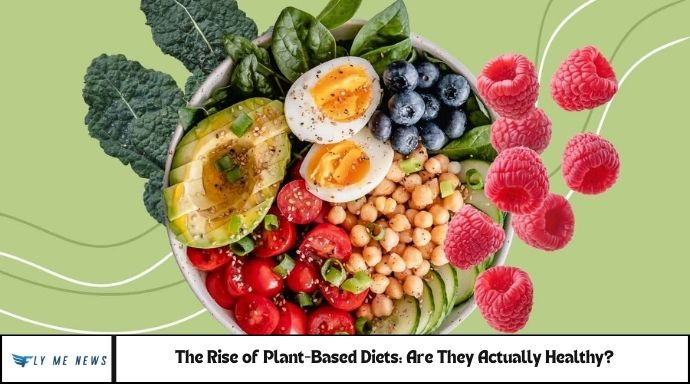The Rise of Plant-Based Diets: Are They Actually Healthy? Plant-based diets have surged in popularity, with countless people embracing the idea of eating more fruits, vegetables, legumes, and grains. But while many celebrities and influencers promote these diets as the key to better health, the question remains: Are plant-based diets actually healthy? This article will explore the rise of plant-based eating, examine its health benefits, potential drawbacks, and provide insights into how to adopt this lifestyle properly for long-term wellness.
Plant-based diets has skyrocketed, with more people choosing to swap meat and dairy for fruits, vegetables, grains, legumes, and plant-based alternatives. From health-conscious individuals to environmental advocates and ethical eaters, plant-based diets have become more than just a trend — they’re a lifestyle choice embraced by millions worldwide. But as this shift gains momentum, a critical question arises: Are plant-based diets really as healthy as they seem?
The rise in plant-based eating is fueled by compelling reasons: health benefits, environmental sustainability, and ethical concerns surrounding animal welfare. In fact, a growing body of research supports the idea that plant-based diets can help prevent and manage chronic diseases like heart disease, diabetes, and obesity. According to the American Heart Association, plant-based diets rich in fruits, vegetables, whole grains, and legumes can significantly improve heart health. However, despite the numerous advantages, there’s a lot of misinformation and confusion about what it takes to thrive on a plant-based diet.
The Growth of Plant-Based Diets
Why Are Plant-Based Diets So Popular?
Plant-based diets are experiencing a boom in popularity due to numerous factors, including:
- Health benefits: Many studies suggest plant-based diets can reduce the risk of chronic diseases like heart disease, diabetes, and cancer.
- Environmental impact: Reducing animal product consumption helps lower carbon footprints, making plant-based diets more eco-friendly.
- Ethical considerations: With growing awareness of animal welfare, people are turning to plant-based diets as a more humane option.
The rise in plant-based eating is also fueled by the increasing availability of plant-based products and a wider variety of choices in grocery stores, restaurants, and fast food chains.
Health Benefits of Plant-Based Diets
What Are the Health Benefits of Plant-Based Eating?
When adopted correctly, plant-based diets can provide several significant health benefits:
- Reduced risk of heart disease: A well-balanced plant-based diet is rich in fiber, antioxidants, and healthy fats, which help lower cholesterol and blood pressure.
- Weight management: Studies have shown that plant-based diets are associated with lower body mass indexes (BMI) and reduced obesity rates.
- Improved gut health: High-fiber foods like fruits, vegetables, and legumes promote healthy digestion and gut microbiome balance.
- Lower risk of certain cancers: Some research indicates that plant-based diets may lower the risk of colorectal, breast, and prostate cancers due to high levels of antioxidants and phytochemicals.
According to the American Heart Association, plant-based diets can significantly improve heart health by reducing the intake of saturated fats and increasing the consumption of fiber-rich foods.
Potential Drawbacks and Nutrient Considerations
Are There Any Risks to a Plant-Based Diet?
While plant-based diets offer numerous health benefits, it’s essential to address some potential drawbacks:
- Nutrient deficiencies: People following plant-based diets may lack key nutrients such as vitamin B12, iron, calcium, and omega-3 fatty acids, which are typically found in animal products. Supplementation or careful food choices are necessary.
- Protein intake: Although plants like beans, lentils, and tofu are great protein sources, some individuals may struggle to meet their protein needs, especially athletes or those with higher energy demands.
The key to a healthy plant-based diet is proper meal planning and ensuring that essential nutrients are included.
How to Build a Healthy Plant-Based Diet
What Should You Eat on a Plant-Based Diet?
A healthy plant-based diet focuses on a variety of whole, unprocessed foods. Here’s what to prioritize:
- Fruits and vegetables: Aim for a variety of colors and types to ensure a range of vitamins and minerals.
- Whole grains: Brown rice, quinoa, oats, and barley provide essential fiber.
- Legumes and beans: These are excellent sources of protein and iron.
- Nuts and seeds: They offer healthy fats and protein while helping to curb hunger.
- Fortified plant-based products: Items like fortified plant milks and cereals can help provide vitamin B12 and calcium.
May you also like it:
Companies Announcing Major Layoffs and Hiring Freezes in 2025
Leftist Lula Edges Bolsonaro in Brazil’s Presidential Election Run-off
Repairing the EU-ASEAN Disconnect in Trade Relations: Key Solutions
Frequently Asked Questions
1. Can you get enough protein on a plant-based diet?
Yes, many plant-based foods like beans, lentils, tofu, quinoa, and nuts provide ample protein. It’s important to eat a variety of these foods to meet your protein needs.
2. Is it necessary to take supplements on a plant-based diet?
While a balanced plant-based diet can provide most nutrients, supplements for vitamin B12, vitamin D, and omega-3s may be necessary for some individuals.
3. Can a plant-based diet help you lose weight?
Yes, studies suggest that plant-based diets, which are often lower in calories and fats, can aid in weight loss and healthy weight management.
4. How do I ensure I’m getting enough calcium?
Include fortified plant milks, leafy greens, almonds, and tofu in your diet to ensure adequate calcium intake.
5. Are plant-based diets suitable for children?
Yes, plant-based diets can be healthy for children if properly planned to meet their nutritional needs, including protein, vitamin B12, and iron.
6. Do plant-based diets really prevent heart disease?
Research supports that plant-based diets can significantly reduce the risk of heart disease due to their high fiber and antioxidant content.
Conclusion
Plant-based diets offer numerous health benefits, including weight management, improved heart health, and reduced cancer risk, when properly balanced. However, it’s essential to be mindful of potential nutrient gaps, such as vitamin B12, iron, and protein, by carefully planning meals or supplementing where necessary.

